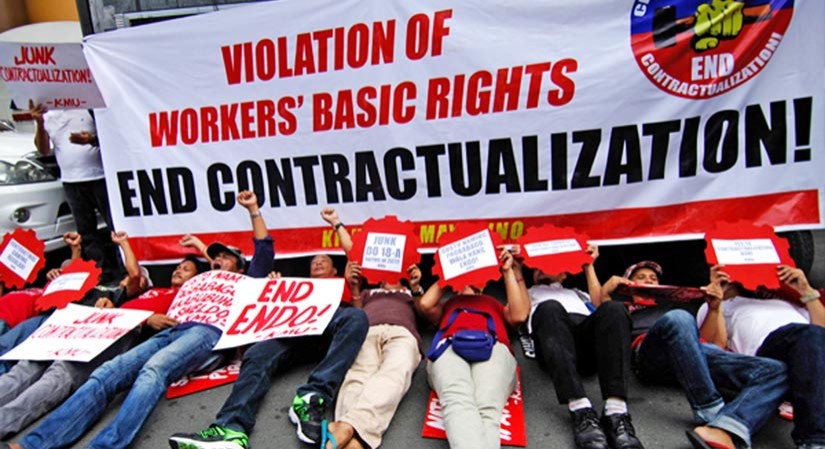
PRESIDENT Rodrigo R. Duterte’s remarks about employment practices in his third State of the Nation Address (SONA) raised concerns from business groups, who defended the usefulness of contract labor.
They distinguished between workers hired on a project or contract basis, a practice which they described as essential to help them adjust to periods of low demand, as opposed to “endo,” which is the illegal termination and rehiring of workers before they reach the six-month employment threshold, thereby denying them a path to legal benefits and entitlements for permanent employees.
Danilo C. Lachica, president of the Semiconductor and Electronics Industries in the Philippines Foundation, Inc. (SEIPI), said while SEIPI “supports the abolition” of contractual hiring, though he “suggested” that industries such as his be permitted to hire on a project basis “because of the volatility of the demand for electronic products. There are times that the demand is extremely high and extremely low, depending on the technology.”
He added: “We are suggesting that the DoLE (Department of Labor and Employment) consider the specificity of certain industries.”
Having said that, Mr. Lachica said when it resorts to contract labor, the industry taps “legitimate service providers who will surely comply with the requirements of the law including providing (workers) with benefits.”
In his SONA on Monday, the President urged Congress to pass legislation that will stop illegal employment practices. “I am asking Congress to pass legislation ending the practice of contractualization once and for all,” he said.
Employers Confederation of the Philippines (ECOP) acting president Sergio Ortiz-Luis, Jr. said, “He has concerns about endo… The problem is that he used the term “end of contractualization.” The legislators might think that the President has taken the position of labor groups to allow no exceptions in banning contractualization.”
Philippine Chamber of Commerce and Industry (PCCI) chairman George T. Barcelon said the President “made it appear” that “endo and contractualization are the same.”
European Chamber of Commerce of the Philippines (ECCP) president Guenter Taus said the European Union (EU) business community in the Philippines “supports the thrust of the new administration in curbing abuse of contractualization of workers in the Philippines. Not only will the end of the abuse on contractualization protect workers’ rights, but it will also remove the unfair competition posed on compliant industry players.”
Chamber of Mines of the Philippines (CoMP) executive director Ronald S. Recidoro said he shares the President’s concerns about destructive mining. “But when it comes to legitimate large-scale mining, we have to tell the President that there are responsible miners in the country. In fact, we have been complying with his instructions,” he added.
As for the proposed second package of the tax reform law, which hopes to rationalize incentives offered to investors, particularly manufacturers locating in special economic zones, SEIPI’s Mr. Lachica said, “We just shared a couple of suggestions for TRAIN 2 (Tax Reform for Acceleration and Inclusion Law). Specifically, our suggestion to DoF (Department of Finance) was 10% income tax but inclusive of the local business taxes. The President did not go into detail, but I just want to clarify that we support tax reform.”
PCCI’s Mr. Barcelon also expressed his optimism that the remaining four packages of TRAIN will be passed within Mr. Duterte’s term. “We subscribe to that and we see the logic. I think the packages will pass through Congress.”
British Chamber of Commerce Philippines (BCCP) chairman Chris Nelson said: “We were pleased regarding the President’s reference to the Ease of Doing Business Act.”
Mr. Taus concurred, saying that the ECCP supports “the government’s resolve in faithfully implementing the Ease of Doing Business Act, simplifying business procedures, and cutting red tape so as to make the Philippines a competitive investment destination. We hope that the call of the president to sustain the momentum will trickle down to all local government units in order to expedite all processes and restore public confidence.”
As for investment in Mindanao, the ECCP agreed with the President in recognizing the potential of the southern island as a center for economic growth.
“We commend the focus on this administration in creating lasting peace in the region through the Bangsamoro Organic Law,” he said.
BCCP’s Mr. Nelson added that the BCCP supports the President’s economic plans, especially those that have to do with “developing business outside Metro Manila.”
Asked for some points of concern in the President’s SONA, Mr. Taus said: “The ECCP understands the commitment of the government to deliver the best services to the Filipino people through numerous social and economic reforms. For this reason, the tax reform program of the government is crucial in creating a simpler, fairer and more efficient system; implementing the administration’s infrastructure and social development programs; and creating a more business-friendly environment in the country.”
“While we are pleased that several business concerns have been raised, we look forward to hearing more about the a number of other issues in the report that was mentioned would be released in the coming days. Namely, these issues include infrastructure, manufacturing, retail trade liberalization, liberalization of PCAB licensing, amendments to the Public Services Act; and the Foreign Investment Negative List (FINL).”
Federation of Indian Chambers of Commerce and Industry (FICCI) president Rex Daryanani said: “We would like to see more focus on leveling the playing field to encourage everyone to pay to government what is due to government. It is the absence of a level playing field that prevents many from doing so.”
Article was originally published on July 24, 2018 at the Business World Online.